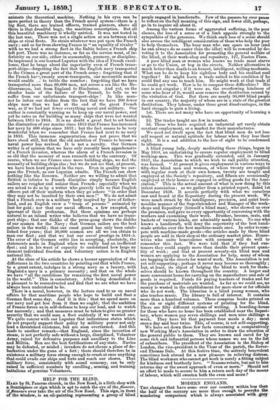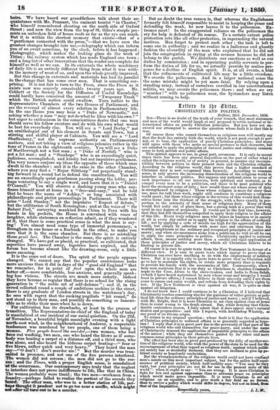MODERN ENGLAND. THE changes that have come over our country
within less than the half of the century are more than enough to provoke the wondering comparison which is always associated with grey
hairs. We have heard our grandfathers talk about their ac- quaintance with Mr. Pennant, the eminent tourist "in Chester," who himself remembered shooting on the north side of Oxford Street; ; and now the view from the top of St. Giles's steeple pre- sents an unbroken field of house roofs as far as the eye can reach. But it is within the shortest memory that exists—that of a "gentleman connected with the press,"—that we have seen the greatest changes brought into use,—telegraphy which can inform you of an event sometime by the clock, before it has happened ; photography, which makes the looking glass do the work of Titian ; the railway system which has made England one town ; and a long list of other innovations that the reader can complete for himself as well as we can. In its externals the whole machinery of daily life is an entirely different thing from what it was with- in the memory of most of us, and upon the whole greatly improved. But this change in externals and materials has had its parallel in the change that has come over men. That is something sur- prising. It is not fair to turn to the Press, since the Press as it exists now was scarcely conceivable twenty years ago. Mr. Cobbett or the Society for the Diffusion of Useful Knowledge could hardly have conceived the amount of "Twopenny Trash" which the British nation could swallow. Turn rather to the Representative Chambers of the two Houses of Parliament, and see the reversal of almost every relation in Parliamentary life. In the one House you may hear a "Duke of Newcastle," not asking whether a man "may not do what he likes with his own ? " but eager to enthusiasm in the conscientious desire that one man should serve his fellow creature and do with his own what would be best for everybody else. You will see a "Lord Derby," not an ornithologist out of his element in Senate and Town, but a stirring and skilful player at Cabinets. You will see a "Lord Shaftesbury," not the supreme authority on Parliamentary matters, and not taking a view of religious polemics rather in the tone of France in the eighteenth century. You will see a Duke of Marlborough not a fast man ; a "Duke of Norfolk" who is not a fat man ; and a "Stanhope" who is an exceedingly quiet, judicious, accomplished, and kindly but not impulsive gentleman. The very names conjure up ideas the opposite of those which once dwelt in the chamber ; and it is the same in the other Chamber, where you may find a "Major Sibthorp " not perpetually stand- ing forward in a round hat to defend the constitution. You will see an exceedingly quiet gentleman passing along the lobby, per- haps venturing to say a single word, and learn that it is "Daniel O'Connell." You will observe a dashing young man who con- fesses himself most at home in a "free-and-easy," and be told that he bears the name of "Ashley," so long associated with philanthropic and pietist proceedings in Parliament. There will arise "Lord Stanley," not the impulsive "Rupert of debate," but the utilitarian of South Kensington ; and. at the voice of" Sir Robert Peel," surveying mankind from China to Peru with his hands in his pockets, the House is convulsed with roars of laughter, while statesmen on reflection admit, as if they wondered at it, that there is some practical sense in what the man is say- ing! You almost need some type of immortal permanency, a Brougham in one house or a Roebuck in the other, to make you sure that it is the same chamber. But there is no mistaking those genii loci. The Chamber is the same the spirit is entirely changed. We have got so placid, so practical, so cultivated, that asperities have passed away., bigotries have expired, and the forum has become almost like the drawing-room, only a little more amusing. It is the same out of doors. The spirit of the people appears changed. We cannot say that the popular countenance looks more anxious than it did in days of the "good old England" that we remember, for in point of fact upon the whole men are better of,—more comfortable, less anxious, and generally speak- ing less vicious. The streets are much more orderly. Indeed they have become so re at there is no school for the rising generation in "the noble theart of self-defence " • and if, in the crowd collected round a couple of ambitious urchins in the street, there is any graduate of London streets in the watchman's day, he sees with regret that the sucking pugilists "hit round," do not stand up to their man, and possibly do something so lament- able as to strike their man when he is down.
For cultivation has its drawbacks, at least in the process of transition. The Representative-in-chief of the England of today is scandalized at one incident of our social quietism. On the 22d, of November, a beautiful bright moonlight evening with a light north-east wind., in the neighbourhood of Andover, a respectable tradesman was murdered by two people, one of them being a woman. _Ere people heard the murder' —two women, who had been out washing, two men one who heard the blows as if some- body was beating at carpet 't a distance off, and a third man, who was alone, and also heard the hideous carpet beating—" four or five blows, rather quick and very heavy. They heard the man say—" 0 don't ! don't murder me ! " But the murder was tran- sacted in presence, and not one of the five persons interfered. The women did not scream ; the men did not go to the res- cue; and the Times, with a proper English sense, is scandalized at the occurrence.. Our conteo. .rary says truly that the neglect to interfere does not prove indi mace to life, like that in China. The women probably were timid ; the two men—workmen from a
foundry—perhaps failed to realize the portent of the sounds they The other man, who was in a better station of life, per- haps thought it prudent not to go too near a scuffle, which might not after all turn out to be a murder.
But no doubt the true reason is, that whereas the Englishman formerly felt himself responsible to assist in keeping the peace and defending the weak, he now leaves it to the policeman. Ex- tremes meet! In the exaggerated reliance on the policeman the cry for help is defeated of its rescue. To a certain extent police protection acts like all other protection, in superseding the natural motives. Men forget to protect each other ; the task is left to some one in authority ; and we realize in a ludicrous and ghastly fashion the absurdity of the man who explained that he did not join the congregation in crying at the sermon because he did not belong to the parish. We distribute our emotions as well as our duties by commission ; and in appointing public servants to per- form the duties of life for us, we actually provide by malice pre- pense for a decline of English spirit. It is, at all events, a hint that the refinements of cultivated life may be a little overdone. We overdo the policeman. And in a larger national sense the the same mistake might be yet more fatal. By relying upon a standing army, instead of ourselves enrolled in our constitutional militia, we may overdo the policeman there ; and when we cry " murder ! " with no policeman near, the bystanders may listen without coming to help.







































 Previous page
Previous page